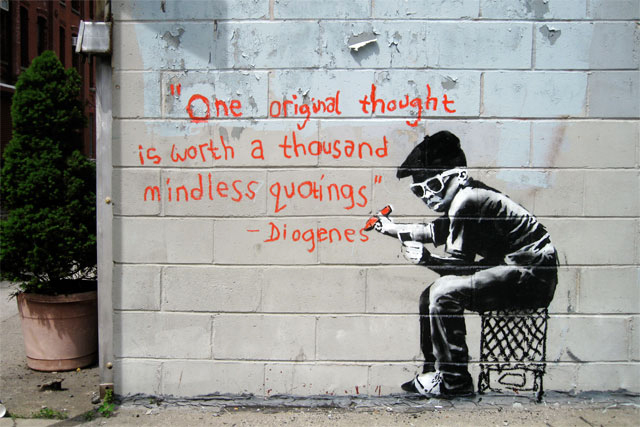Exit Through The Liquor Store
I finally got around to watching Exit Through The Gift Shop last night on Netflix instant and found so many parallels between the liquor industry and Banksy's message about art that I went to bed with my head spinning. I won't ruin the movie for those who haven't seen it, but a critical theme of the movie concerns street artists who don't actually have any art in them - somewhat likable people who are motivated and excited about the possibilities of graffiti, but seem more interested in fame, money, or notoriety than actual expression.
I've been fascinated by my generation's penchant for believing they can do anything. There have always been ambitious people with little talent for what they're trying to achieve, but it seems to be much worse now than I ever remember it being. I think this comes from an inflated sense of self worth (given to us by teachers who told us we were very special when perhaps we weren't) and the instant audience provided from the world wide web. Nowadays, one can instantaneously present their work to the world before the previously-important keepers of the gate can criticize or reject it (i.e. museum curators, book editors, night club bookers, distinguished professors, etc). The internet has provided everyone with a voice should they want one.
With that voice some people have chosen to focus more on the marketing of themselves or their product than the actual substance of what they are doing. Today one can witness tequila companies starting up overnight with fancy websites, quotes from famous experts in the industry, and a barrage of media hype, similar to the Mr. Brainwash blitz in Gift Shop. There's no love, art, talent, or romance in many of these products, as they're simply the result of investors paying someone else to do the work for them (like distilling, aging, harvesting, etc.). Yet, many of these campaigns are effective because people still tend to believe the hype.
Whether or not Banksy's film is the perfect analogy or a giant prank on the public, the lessons are still legitimate. The story is proof that people with no actual ability for the profession they've chosen can still be considered talanted, be profitable, and succeed by stealing ideas from others. The desire by investors, collectors, and enthusiasts to purchase and own products like these is perhaps the biggest joke that Banksy exposes with his film. The public's willingness to buy into the authenticity of these clowns only legitimizes what they are doing, at the expense of the people who actually know to do it.
You can imagine how true artists like Banksy feel when the medium they've spent years perfecting gets co-opted by the "I can do it too with only five minutes of practice" generation. I'm sure there are many professional distillers, winemakers, and brewers out there dealing with that feeling right now.
-David Driscoll

